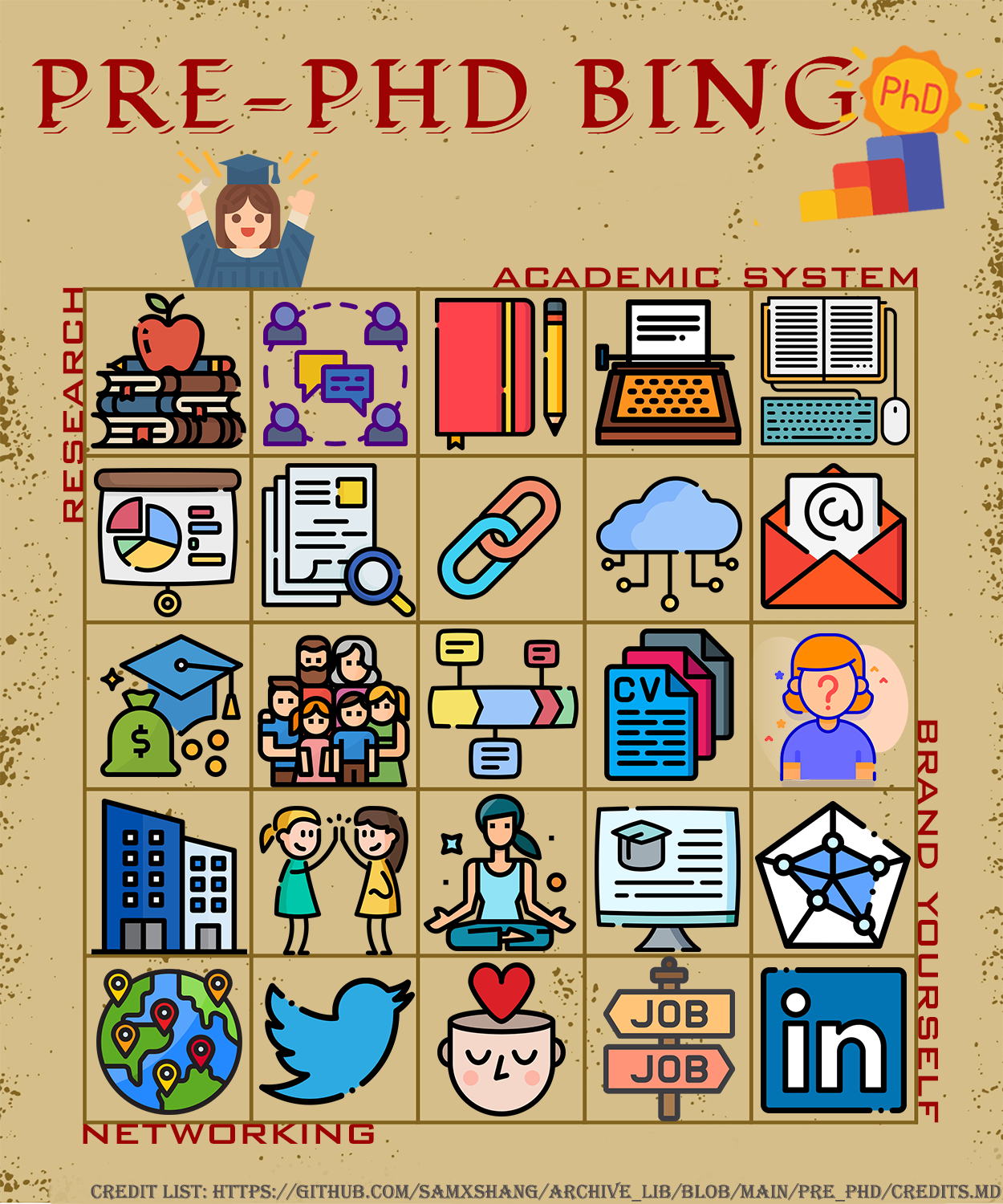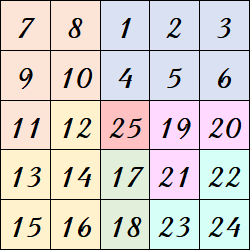Pre-PHD BINGO Game
Twenty-five things I have done to help me prepare for my PhD program.


Academic System (6)
- Day 1: Design a set of note templates
- For class, for meetings, for research progress
- Day 2: Design your own writing templates on your software of choice
- Software: Overleaf, etc.
- One for journal papers, one for course papers
- Day 3: Set up your literature reading routine
- How to take notes, how to connect the notes, etc.
- Day 4: Set up your reference management system
- Software: Zotero, Mendeley, Paperpile, etc.
- Day 5: Set up your local-cloud syncing/backup system
- Cloud: GitHub, google drive, one drive, etc.
- Day 6: Set up your email system
- Separate your school life and personal life (bills, games, subscriptions)
- Gmail: use labels; Outlook: use folders
- Set up your email display name and signature
Research (5)
- Day 7: Literature review: Make a reading list of 30 papers (and read them)
- Day 8: Identify 3 most popular academic organizations in your area (national, international, local), and join them
- Day 9: Identify 2-3 most common conferences your lab/cohort/department attend
- Check their submission dates and conference dates
- Find at least one that allows grad students to give talks; those tend to be smaller, more local, so less nerve-wracking and less competitive
- Day 10: Identify 5 top journals in your area
- Check their submission requirements
- Day 11: Identify 3 scholarships/grants that you are eligible for
- Check your department website for scholarship/grant information
- Check the application ddls and requirements
Networking (5)
- Day 12: Know your lab
- How many people are in your lab
- How many faculty members - normally just one
- How many grad students, undergraduate RAs, post-docs, etc.
- Day 13: Know your department
- Identify 2-3 faculty members from your department other than your advisor that you would like to collaborate with (they could be your potential dissertation committee members)
- Day 14: Know your cohort
- Check the grad students of your area on your department website
- Look up the incoming students (contact your department for the list if they haven’t sent it out)
- Day 15: Expand your horizons, the world is your oyster
- Check 2-3 schools in your province/state, and check their department websites too!
- Check their faculty members, grad students, who they invite to seminars, etc.
- Day 16: Make an academic Twitter, follow 10 people in your field
Outside of academia (2)
- Day 17: Find one constant outside academia
- You need a “go-to” thing when your relationship with academia hits a rough patch
- Academia is like your partner, and this constant is like your best friend. Partners come and go, but friendship is forever! Find the one thing that you love and know that can always make you feel better.
- Could be your pet, a hobby (painting, sports, music…)
- Day 18: Check therapy information
Brand yourself (3)
- Day 19: Make a CV/Update your CV
- Identify 5 early-stage assistant professors in your area as role models, especially those who have a similar background as yours (e.g., English as a second language, immigrant, first-gen, etc.)
- Read their CVs, think about how they have got here
- Imagine yourself in 4-5 years (when your earn your PhD) and make an “ideal CV” for the post-PhD you
- Based on the “ideal CV“, update your current CV; be conscious of the gaps
- Day 20: Write a 100-word summary about yourself
- Include your background, research interests, and life outside academia
- You might need this for your new lab’s website
- Day 21: Make a personal website
- I used to use Wordpress, and I have been considering GitHub Pages lately
Make a Plan B, and make it now (3)
- Day 22: List 5 transferable skills from your PhD
- Day 23: Identify 3 possible non-academic job titles
- e.g., industry, NGO, research institutes
- Day 24: Make a LinkedIn page/update your LinkedIn
- You don’t even need to make a resume right now, just start copying and pasting things from your CV to LinkedIn as a starting point
- You will have a seemingly okay profile to start building connections with those who work in the industry - you never know when you’ll have the chance to meet them
- You will also feel less overwhelmed when the time comes and you have to make a resume for internships
Finale (1)
- Day 25: Make a 3-year/4-year/5-year PhD plan
Other resources
- Youtube: Dear first year phd student / A Letter To You by Dr Amina Yonis
- Youtube: First year phd student advice - 20 Things to do Early in Your PhD by PhD and Productivity
- Youtube: How to fail a PhD / 5 key things to avoid! by Andy Stapleton
- Youtube: PhD FIRST YEAR TIPS / 16 things to do by Maria B
- Youtube: Advice for New PhD Students / How to Succeed in Graduate School! by Casey Fiesler
- Youtube: Before a phd - 5 secrets for starting strong by Andy Stapleton